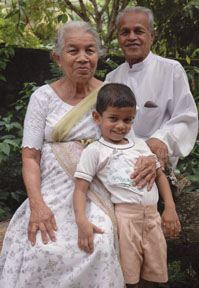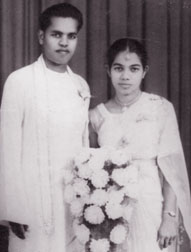|
observer |
|
|
|
|
|
OTHER LINKS |

|

|

|
|
"Why was she foolish enough to marry you?": In this new series, we ask couples how they met - and then the rest...: The bold and the beautiful celebrated with King George 50 years back
Opportunity knocks for every man, but a woman has to get a ring" - Mae West. Knowing or not knowing this, Leelawathie a pretty young village lass of Nivithigala, Ratnapura sent a note to her 'Massina' (cousin), inquiring about the exact meaning of his gestures of love amidst the endless jokes of their other cousins and friends. In a way, the daring young woman wanted a frank answer from him - 'yes' or 'no'. This young woman was extremely 'bold and beautiful', as this happened not recently, but during the most conservative era in 1952. "Let their jokes be a blessing to us...." was the reply she got in return from him. So he said it! What was blooming in both hearts since their adolescence unfolded in petals. The love notes they exchanged secretly nourished the budding love to full bloom. The sweet fragrance of it did not allow them to hide their feelings. None wanted to stamp upon the flames. And under the shower of blessings of their elders the 'Nena' and 'Massina' entered into wedlock on May 30 in 1956. So, Delwakkada Liyanage Chularatne and Habarakada Liyanage Leelawathie, both in their late seventies celebrated their Golden Jubilee of their wedded life this year. Chularatne was born on December 13, 1929, as the second offspring of seven, to D. L. Karolis, Gammuladeni (Village Headman) and Robertthina Wickremasinghe in Batuwangala, Neluwa, Galle. "All my four sisters and two brothers are still living in good health," says Chularatne. "Our house was near the village temple yard. So, we the village boys used that location as our playground. Simultaneously we associated with the chief priest of the temple and learnt the Dhamma through the Jathaka stories and the sermons. During the 1930s, we did not have Sunday Schools, but we had been in and out of the temple throughout our childhood," he reminisces. Chularatne went to three government mixed schools at Happitiya, Batuwangala and Maha Bodhi Vidyalaya at Neluwa.
"At that time, our country was under the British Kingdom, so we used to get presents for the birthdays of the King of England. King George V and King George VI both celebrated their birthdays with us," he laughs. "Our school headmaster had raised a fund among parents and he used this money to buy us presents; mainly school stationery," he says. "We did lot of gardening for physical training (PT). Unlike children nowadays, we loved to work in the garden growing vegetables. But we did not have sports meets as such. The very first sporting event we had in down south Galle was held on September 28 in 1946. I took part in the440 yards running track event and won second place," says Chularatne while proceeding to their bedroom to fetch the certificate he received for his memorable triumph. "He still runs," butted in his wife who was listening. "He has never missed the running track events at the Avurudu games held in our village, Neluwa," she giggles. Social service workSubsequent to sitting for the Senior School Certificate (SSC) young Chularatne engaged in village social service work. Although he was the youngest of the social workers in the village Chularatne was appointed as the secretary in almost all the village societies, as there were a few well educated persons in the area. Chularatne's very first appointment was with Maliban Mudalali at Ratmalana. He was just 18 years when he had to stand-in as a store keeper for his friend. He stayed there for a month for the princely sum of Rs. 120. Maliban Mudalali was quite happy with his work and offered him a permanent job there. But Chularatne did not want to stay. The young man had many excuses for that. But the real reason behind it was something else. He found a job as a Manager at A. C. Perera and Sons wholesale dealers at Kahawatta, Ratnapura. This place was somewhat close to his dream girl, Menike (...and that is Leelawathi's pet name)... Menike's parents thought their favourite nephew was visiting them for the love of them, his elders, and were quite fond of him. None suspected the young rake was inveigling the beautiful Menike. Chularatne visited them on a Poya Day onc afternoon. Unlike today, the Upasakas and Upasikas who observed Sil in the village temple used to go home for lunch as there weren't arrangements to offer 'Dana' for them in the temple. So one this day, Menike's mother who observed Sil had come home with many other Upasikas, who waited till afternoon tea. After offering them tea, Menike served a cup of tea to her 'Massina' to boot. A mischievous cousin who was watching this waited until Chularatne consumed half of the tea, and almost grabbed it from him and offered it to Menike to drink it before everybody. Menike felt acutely embarrassed and tried hard to hide her blushes. But, to her surprise, Chularatne was quite positive and was laughing. She thought this was not the first joke at their expense by their cousins. But still, she hadn't got any word from him. She was hurt. "That's enough!" she thought. So she decided to take the initiative. Menike did not have a proper meal for two days until she received his answer. The bold and beautiful, Menike alias Leelawathi was born on July 24 1928 to H. L. Hendric Appuhamy, Contractor and D. L. Baby Nona in the sleepy and pretty village of Nivithigala, Ratnapura. She was the third of seven siblings. Menike studied upto seventh standard at Nivithigala Kanishta Vidyalaya until she grew into adolescence When she attained age, she had to obey the tradition of that time and had to stay at home to follow the course work of 'home and company'. Unlike many other girls, Menike was quite an enterprising young woman. She learnt sewing, pan weaving, iratu and coir work, clay work, crocheting, machine embroidery, saree decor and bridal hair designing with wires. She was eighteen when she got to know that many of her village female friends were going to work at a handloom weaving mill in the area. After much hesitation she got the required permission and joined her friends. The little salary she earned seemed a fortune to her. She was happy to be independent. With that money she managed to buy her jewellery, and went on pilgrimage and 'Vata Vandana' including Anuradhapura and Sripada. She weaved her sarees on her own, and presented her heartthrob 'Massina' many 'Veyttis' (sarongs) and towels of her own creation. When Chularatne's mother got to know that her favourite son had fallen in love with her sister-in-law's daughter, she opposed the development tooth and nail. But that was until her son fetched his bride home. From the very first night, Menike became her favourite daughter-in-law. Menike wore a Kandyan Osariya and seven gold necklaces along with the 'Nalal Patiya' (gold head dress) and stood beside the national dress Chularatne on the 'Poruwa' when 'Ashtaka' and 'Jayamangala Gaatha' were recited to bless the new couple. The wedding was held at the bride's place. A 'Magul Maduwa' (a tent for guests to stay) was built with wood and a thatched roof. It was well decorated with white decorative cut-work papers and colourful flower vases. Teaching postThe young couple didn't go anywhere special for their honeymoon, but headed for Chularatne's place in Neluwa. After a few days, Menike's folks and other relatives visited the new couple as the culminating ritual of the wedding. Chularatne drew Rs. 150 monthly at A. C. Perera and Sons. Also he handled the famous Gymkhana Lottery as his boss was the agent for that area. "Unlike today, those who wanted to join it paid Rs. 2.00 and gave their names and addresses. We used to collect the names and money and handed the details over to the Gymkhana Clubs in Galle and Colombo. The tickets were posted to each competitor. The biggest amount won at that time was Rs. 120,000. I never won a cent but got a commission of a few cents from each Rs. 2.00" laughs Chularatne. But the Gymkhana did not exist after 1956. Chulartne applied for a teaching appointment through the Ratnapura Education Office. He got the opportunity to be a teacher twice, but did not want to leave Ratnapura as his sweetheart was in that town. But once he married her, he thought of accepting the teaching post. Chularatne had to part from his new bride for a few months as the first appointment came along almost as a wedding gift to him, when he was so many miles away from home. But it was for short while. The newlyweds nested in a small thatched clay hut in a beautiful scenic area where Chularatne was teaching. He taught at schools at Thalagahawatta at Ratnapura and two of the schools he studied at Happitiya and Batuwangla in Galle. "I have never caned a child or hit anybody. I have had the gift of subduing anyone by words, either politely or harshly. This helped me a lot after I became a Grama Sevaka. Many village criminals were tamed by me in that way," he says. Having been a teacher for seven years, at the age of 33, Chularatne became a Grama Sevaka. It was his parents' wish. They assumed it was a prestige for them if their son followed the footsteps of the village headman father and held a post of that kind. A Grama Sevaka drew a higher salary of Rs. 250 than a teacher who got Rs. 124 in 1956. "I served as a Grama Sevaka for 21 years at Neluwa. Not a single criminal act or robbery was recorded in my Grama Sevaka area while I was holding the post and it is a record," he claims. Chularatne built a new nest in his village at Neluwa, and the couple were then blessed with three children. "Our eldest daughter is a teacher in Galle and the second daughter, Padmini is a librarian. Our son Banduthilaka is the youngest. He is a lawyer and an Assistant Superintendent of Customs. Following his parents' footsteps their son also married his 'Nena' ( Manike's elder brother's daughter) We have four grand daughters and four grand sons. And this is the youngest of all," says Menike cuddling their youngest grand son, Sanel who just returned home from the Montessori. RetirementChularatne retired from government service in 1992, and held many posts in the Government Pensioners' Association, 'Dayaka Sabhas' of many temples and other village social servicing societies until 2003. After Chularatne fell ill briefly, their son fetched them to his shelter at Maharagama. "We were living alone at our village home after our children found jobs, got married and settled down in other places. We miss our village. But what to do? It would be a burden for our children if we stay away from them as they are really worried about us, especially after my ailment. They look after us. Thanks to our son both of us went on a pilgrimage in India as well," smiles Chularatne. "We never had any argument, and ours was a quiet and serene wedded life. |










